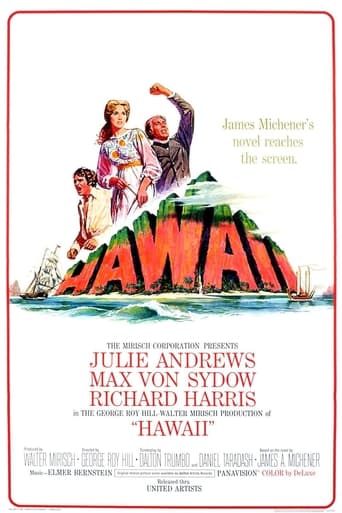SimonJack
If Hollywood were subject to truth in packaging laws, its promotion of many movies would certainly be grounds for lawsuits. A case could be brought against Mirisch and United Artists for its promotion of "Hawaii" as being based on James Michener's novel of the same title. In reality, this film is based on one chapter – about 17% of the book. It's also billed as epic and that's questionable because it covers just a little more than 20 years. If one was expecting to see Michener's epic on film, this isn't it. Nor is there a whole film on the novel. But, it is a fair rendition of chapter three of the novel. It's a story of some of the earliest Christian missionaries – the Calvinists, and their efforts to convert the native Hawaiians. The screenplay interweaves some of the folklore of chapter two as well, with the flight of the people a millennium before from Bora Bora. It covers well the traditional conflict that drove the people to flee to this new land. As Malama Kanakoa (played by Jocelyne LaGarde) says, they fled because other islands were trying to force them to worship the terrible and mean god of fire, Oro. The people wanted to keep their god of happiness, Tãne, so they brought him with them to Hawaii. The movie shows the clash of cultures that occurred. Such happens throughout history with the movement of peoples from one place to another. Religion, social customs, dress, food and all aspects of society and life clash when different cultures collide. Here, the major clash is between religious beliefs. The purveyor of the Calvinist brand of Christianity here is an even sterner and harsher missionary, Rev. Abner Hale, played by Max von Sydow. He is accompanied by his new wife, Jerusha Bromley, played by Julie Andrews. The plot has a little intrigue, with a former love interest of Jerusha's in Capt. Rafer Hoxworth. Richard Harris plays the whaling master, who is portrayed as a heathen in his own right. Some other major characters are Dr. John Whipple (Gene Hackman), Keoki (Manu Tupou), and Charles Bromley (Carroll O'Connor). The story begins around 1820. It was filmed in Hawaii, Tahiti, Norway and the living history museum of Old Sturbidge Village in Massachusetts. It was a box office success, yielding more than twice its budget. And, it was well received by the critics of the day. But, it failed to garner a single Oscar form seven nominations for Academy Awards. The only major awards it won were two Golden Globes. Jocelyne LaGarde was chosen by the Hollywood foreign press as best supporting actress. And Elmer Bernstein won the Globe for best original score. Both of these were well deserved. While all the players were adequate to good, one other stood out. Max von Sydow was excellent as Rev. Abner Hale. He put energy into the role. And, he got slapped around and knocked down more times than any character I can recall in my years of watching movies. He did receive a Golden Globe nomination as best actor. Hale was Michener's caricature of Hiram Bingham, the real early New England missionary to Hawaii. Bingham led the first group of Protestant missionaries to the Sandwich Islands (the Kingdom of Hawaii). They arrived in 1819. He eventually won over the queen, Ka-ahumanu, and urged her to develop a strong anti-Catholic policy. Hawaiians who became Catholic were persecuted for decades. As the movie shows, the missionaries in time began commercial enterprises and many became founding families of the new state. With a fine musical score and wonderful scenic shots, the film still comes up short. It doesn't seem to have much life. At times, it seems somewhat like a daytime soap opera. But for von Sydow's exuberant performance (almost scary at times), the characters seem mostly to just be going through the motions of putting on a play. Manu Tupou as Keoki comes alive in a couple of scenes, but otherwise the story and the film seem flat. The story is just interesting enough to keep one watching. But by no means is this an epic film. An epic production of Michener's novel would be welcome.
Steffi_P
By this point, the mid-1960s, the old-style biblical epics had more or less died out completely, but epics of other kinds were still reasonably popular. This story of missionaries in the first half of the 19th century, adapted from a James A. Michener novel and made a year before the abandoning of the Hollywood production code, is in fact a polemic against rigid adherence to Christian scriptures. At its centre is an overly pious and sometimes hypocritical preacher, the kind of mind which would have believed in all those unswervingly self-righteous bible flicks of the previous decade.But Hawaii is not some flagrant and roughshod denunciation of church and faith. The picture was adapted (quite liberally) from its source by acclaimed screenwriters Daniel Taradash and Dalton Trumbo, and it has in particular Trumbo's tendency to treat all his characters with respectful and human portrayals, in spite of what antagonisms they may have towards each other. Thus while Max von Sydow is seen at turns as a callous fanatic, a trumped-up fool and a general negative influence, we first see him as a shy yet well-meaning youngster, clumsily trying to woo Julie Andrews. In these early scenes he is somewhat endearing figure, and even though most viewers will not condone much of what he later does, this first impression sticks with us, preventing us from completely despising him and allowing us to believe in his wife's devotion to him.Max von Sydow was an excellent choice for this role. Admittedly his Swedish accent is a bit of a non-sequitur, but he is perfect at bringing out both the sympathetic young lad and the unshakable preacher. His performance occasionally seems to border on the hammy, but this is acceptable because it fits in with his strength of character and the earnest manner with which he takes up his ministerial duties. Julie Andrews is great too. After having made her name with the more or less fantasy figures of Mary Poppins and Maria von Trapp there's a strange kind of poignancy seeing her suffer the strains of being a more realistic wife and mother. She seems sadly underused here however, although apparently she was the main victim of the cuts in the edited version I have, which is a real pity. Richard Harris and Gene Hackman bring their forceful presences to make some of the more powerful statements in the dialogue, while Jocelyn LaGrande makes a terrific impact with her full-of-life performance. Although she spoke no English and learned her lines phonetically, it's incredible the way she communicates meaning and emotion around those words.Hawaii was the first large-scale picture directed by George Roy Hill, and by and large he handles the broad canvas well. Of note is that fact that he gives a constant life and rhythm to the island, often featuring a few figures working in the background or framing a character with gently swaying foliage. Hill was of course a child of the New Wave and this is evident in the occasional zoom or whip pan, but his touch is generally quite light and minimalist. Unlike some of the other younger directors around at this time he favours long takes with few close-ups. The only trouble with this is doesn't seem to quite have developed the knack of subtly making a point within the frame, sometimes using the camera to force our attention on something. An example is when Iliki runs to greet Richard Harris's ship, throwing off her western dress, a moment which seems rather contrived and clunky by the way the camera pans down onto the discarded garment.Hawaii is a far from perfect picture, being neither quite the stunning extravaganza that epics are generally meant to be, nor the stirring human drama it also seems to aspire to. However, it has many moments which come close to both goals, and most importantly has a very honest humanity to it – something so many epics lack – and this allows it to speak its message directly without ever threatening to alienate its audience.
Jim Colyer
Max von Sydow pops up in this story of missionaries who went to Hawaii in the 1820s. It is really the story of his wife, Jerusha, who pines away in the island paradise. Jerusha is played by Julie Andrews, whom I never really cared for, although she was highly regarded in the 1960s. Von Sydow took on a similar role in 1971 in The Emigrants, a film in which he again uproots his wife only to watch her disintegrate. A young Richard Harris is Jerusha's jilted lover. Themes are typical. We watch native Hawaiians suffer as a result of contact with Europeans. The film is a bit too long, but it is worthwhile. I rented it when I decided to go to Hawaii.
MartinHafer
This film is based on the first half of Michener's book, HAWAII. If follows the life of an initially self-righteous and cold missionary when he is one of the first Westerners to move to this exotic locale. This man is played by Max Von Sydow and he is about as fun to be with as a festering boil.Later, partly because of his coldness, his vivacious wife, played by Julie Andrews, runs off and soon dies. Then, after this trauma, Von Sydow changes and begins to look on the natives in much less harsh terms and his heart softens.The final portion of the film involves the massive influx in opportunists and land-grabbers. The once beautiful and proud nation the missionary once new is now quickly disappearing despite his best efforts.Th irony in the film is that initially, Von Sydow so strongly tried to change the Hawaiians from their "heathen ways", only to eventually mourn the passing of their culture.This was an extremely beautiful film and had a lot of fascinating insights into the old Hawaiian culture and royalty (though the whole business about the Queen's husband plucking out his eyes was a bit nasty). But, there was also a shortcoming in how it dealt with the characters. They tended not to be realistic, but more caricatures who were generally one-dimensional. The missionary was either cold and bad or open and sweet. The natives were allowed little depth as well and the Westerners were almost always bad.


